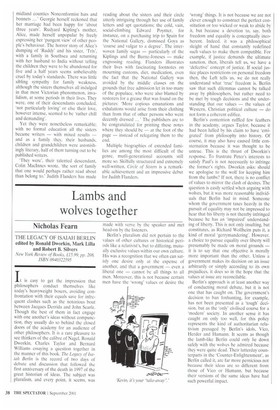Lambs and wolves together
Nicholas Fearn
THE LEGACY OF ISAIAH BERLIN edited by Ronald Dworkin, Mark Lila and Robert B. Silvers
New York Review of Books, 115.99, pp. 208, ISBN 0940322595
It is easy to get the impression that philosophers conduct themselves like today's heavy, weight boxers, avoiding confrontation with their equals save for infrequent clashes such as the notorious bout between Jacques Derrida and John Searle, Though the best of them in fact engage with one another's ideas without compunction, they usually do so behind the closed doors of the academy for an audience of other philosophers. It is a rare pleasure to see thinkers of the calibre of Nagel, Ronald Dworkin, Charles Taylor and Bernard Williams essaying a question together in the manner of this book. The Legacy of Isaiah Berlin is the record of two days of debate and discussion that followed the first anniversary of the death in 1997 of the great historian of ideas. The subject was pluralism, and every point, it seems, was
made with verve by the speaker and met head-on by the listeners.
Berlin's pluralism did not pertain to the values of other cultures or historical periods like a relativist's, but to differing, mutually exclusive values within our own culture. His was a recognition that we often can satisfy one desire only at the expense of another, and that a government — even a liberal one — cannot be all things to all men. Moreover, this is not because certain men have the 'wrong' values or desire the 'wrong' things. It is not because we are not clever enough to construct the perfect constitution or too wicked or weak to abide by it, but because a devotion to, say, both freedom and equality is conceptually incoherent. Indeed, it was a philosophical sleight of hand that constantly redefined such values to make them compatible. For example, if justice demands the ultimate sanction, then, liberals tell us, we have a 'defective' concept of justice. If social justice places restrictions on personal freedom then, the Left tells us, we do not really understand what 'true' freedom is. Berlin saw that such dilemmas cannot be talked away by philosophers, but rather need to be met by tough decisions and the understanding that our values — the values of Western. Christian political culture — do not form a coherent edifice.
Berlin's contention ruffled few feathers in the academy. argues Taylor, because it had been lulled by his claim to have 'emigrated' from philosophy into history. Of course, it may also have caused little consternation because it was thought to be untrue. This is the thrust of Dvvorkin's response. To frustrate Peter's interests to satisfy Paul's is not necessarily to infringe the former's rights. Dworkin asks: should we apologise to the wolf for keeping him from the lambs? If not, there is no conflict of values to mirror the clash of desires. The question is easily settled when arguing with wolves, but it was more reasonable individuals that Berlin had in mind. Someone whom the government taxes heavily in the pursuit of equality may not be impressed to hear that his liberty is not thereby infringed because he has an 'impaired' understanding of liberty. This is not only insulting, but constitutes. as Richard Wollheim puts it, a kind of moral 'gerrymandering'. However, a choice to pursue equality over liberty will presumably be made on moral grounds — it is to say that one objective is morally more important than the other. Unless a government makes its decision on an issue arbitrarily or simply according to its own prejudices, it does so in the hope that the values at issue are reconcilable.
Berlin's approach is at least another way of conducting moral debate, but it is not one that has caught on. The government's decision to ban foxhunting, for example, has not been presented as a `tough' decision, but as the 'only' civilised course for a 'modern' society. In another sense it has caught on only too well, for this policy represents the kind of authoritarian relativism presaged by Berlin's idols, Vico, Herder and Hamann. It seems as though the lamb-like Berlin could only lie down safely with the wolves he admired because they were quite dead. Their latterday counterparts in the 'Counter-Enlightenment', as Berlin called it, are far more pernicious not because their ideas are so different from those of Vico or Hamann, but because their versions of the same ideas have had such powerful impact.


























































 Previous page
Previous page